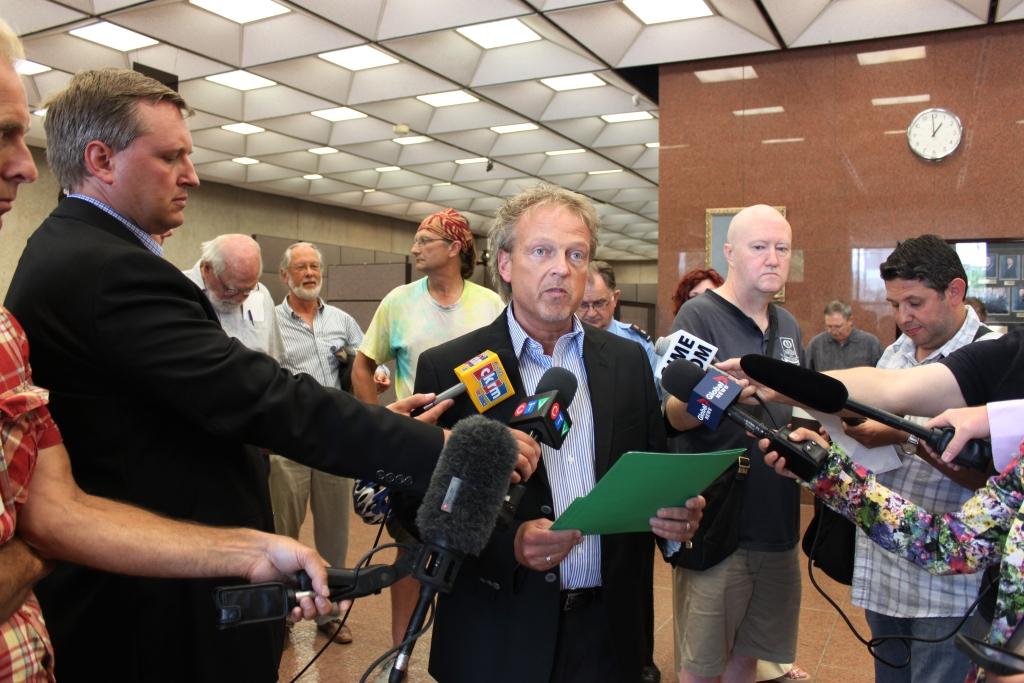 You may have noticed in all the coverage of the rejection of Regina Water Watch’s petition how the clerk’s office conducted two verification processes. First, they excluded petitioners who they felt signed the petition improperly — 4,289 names were removed in this step.
You may have noticed in all the coverage of the rejection of Regina Water Watch’s petition how the clerk’s office conducted two verification processes. First, they excluded petitioners who they felt signed the petition improperly — 4,289 names were removed in this step.
And then the clerk’s office phoned random petitioners to see if they were qualified to sign. The clerk was able to exclude up to another 3,131 names after this.
Well, it turns out, the clerk’s office is only supposed to conduct one of these verification steps. Not both.
I spoke with Jacklyn Demerse, a PhD candidate in political science from the University of Western Ontario who’s studying local government. She’s an expat Reginan who’s taught classes in municipal governance at the University of Regina’s Johnson-Shoyama Graduate School of Public Policy and she’s been following the waste water petition closely. Here’s what she has to say¹ on the clerk’s decision to do two verifications…
It clearly states in the legislation … that when you look at [section 108], you can validate the numbers by going through the list — so, the name, the date, the address, the witness. Or, instead of these things you can do a sample.
So what happened was instead of the city validating the list or taking a sample from the large list what they did is they made that list smaller first and then they took a sample from that. And that’s not something that— it’s pretty clear in the legislation that you do one or the other, you don’t do both.
The legislation that Demerse is referring to is Saskatchewan’s Cities Act. Here’s what it says in section 108 (emphasis added)…
(3) In counting the number of petitioners on a petition, the clerk shall exclude the name of any person:
(a) whose signature is not witnessed;
(b) whose signature appears on a page of the petition that does not have the same purpose statement that is contained on all the other pages of the petition;
(c) whose printed name is not included or is incorrect;
(d) whose street address or legal description of land is not included or is incorrect;
(e) if the date when the person signed the petition is not stated; or
(f) who signed the petition before the date mentioned in clause 107(4)(c).(4) A clerk may use a random statistical sampling method with a 95% confidence level to determine the sufficiency of the petition, instead of verifying that the requirements of subsection (3) have been met with respect to each petitioner.
You’ll note that the legislation says that the clerk can do the statistical sampling instead of verifying every line. Not that the clerk can also conduct a statistical sample.
Couldn’t be more clear.
And you might say, “Well, that’s a pretty small point.” But, if city clerk Joni Swidnicki is going to be so rigorous in her application of the word of law that she’ll delete 2,834 names from the petition because they didn’t include a year with the date, I think it’s fair to expect she apply a similar rigid interpretation of the letter of the Cities Act.
We’re nitpicking the nitpickers, as it were.
It’s also worth noting that the two verification procedures are, according to the Cities Act, supposed to be conducted for the same reason. That being, “to determine the sufficiency of the petition”.
And yet, based on the clerk’s report, they used different criteria on each verification pass. First they checked names, dates, those sorts of things. But when they phoned people, they were checking to see if the person was a resident of Regina, a Canadian citizen, or if they’d signed the petition more than once.
Fair enough.
But you’ll note what they didn’t bother to do was double check when the people they called had signed the petition. You know, see if everyone was signing in 2013 or not.
Now, maybe it’s too much to ask a person if they remember the exact day at the Farmers Market they were approached by Regina Water Watch. But the purpose of that date block on a petition is to make sure the person signed during the allowable date range. It’s important because you don’t want the people running the petition to pad their list by collecting names outside the 90 days the Act allows a petition to be active.
When the clerk began the phone verification, she already knew that she’d excluded over 2,800 names because the people signing had left the year out.
If the clerk was actually concerned with determining “the sufficiency of the petition” through their statistical sampling — and not, you know, just trying to pare down the number of names on a petition so as to scuttle the chance of a referendum going forward — you’d think she might ask people if they signed the petition in 2013 and then apply what she learned from this when making her final evaluation.
But that didn’t happen. And it’s one more reason to think that the clerk was not trying to determine in good faith if the petition was sufficient but rather was working very hard to make the petition fail.
It’s worth noting that according to Demerse, city hall’s petition headaches may not be coming to an end.
It’s certainly in [Regina Water Watch’s] right to take the city to court, if that’s how they feel, that their democratic rights to petition [were hindered] weren’t properly followed through and that there was some sort of negligence in regards to how the legislation was fallowed and how those signatures were petitioned. I’m not a legal expert. But I have had conversations with people who work in the province who have written Cities Act and that’s certainly something that’s available to petitioners if they feel there’s been some sort of negligence in regards to the clerk overstepping or not following the legislation properly.
Ick. A court challenge? This is getting really messy.
——————————————————-
FOOTNOTE
¹ I really hate removing huge chunks of what a person says from the middle of a quote. But to keep this blog post manageable I pulled a chunk of what Jacklyn said out and stuck in an ellipsis. I didn’t change her point about the two verifications but she did say some useful stuff on how the Cities Act was written.
Here’s the full quote with the deleted bit restored and highligted:
It clearly states in the legislation, and this again is the one issue with reading some of this legislation is that it’s silent on a lot of things and so it can be broadly interpreted by municipalities. And that’s something that the province has purposefully done because municipalities have been asking for more and more power and more and more control over their jurisdiction which is certainly in their right to do so. And the province has purposefully made the legislation quite broad so they can do that.
However, it clearly states that when you look at [section 108], you can validate the numbers by going through the list — so, the name, the date, the address the witness. Or, instead of these things you can do a sample.
So what happened was instead of the city validating the list or taking a sample from the large list what they did is they made that list smaller first and then they took a sample from that. And that’s not something that— it’s pretty clear in the legislation that you do one or the other, you don’t do both.





